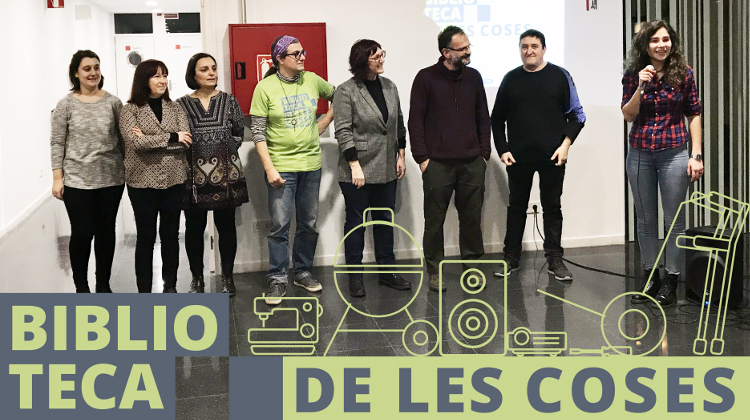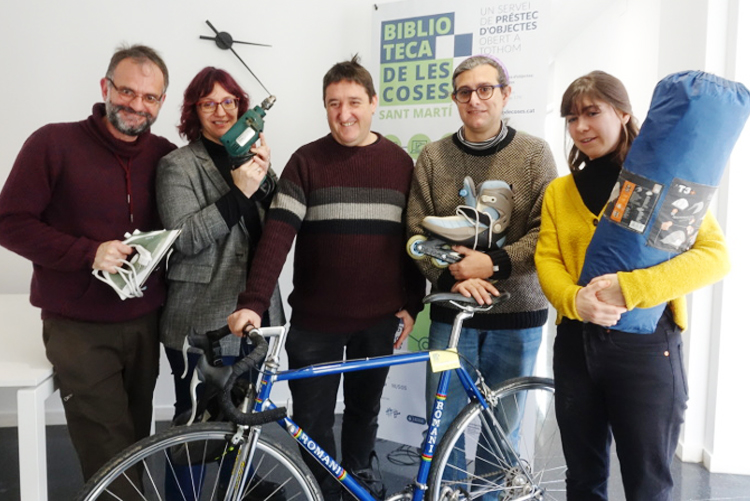
The first Library of Things in Catalunya, a pioneering project in social and environmental economy, is launched.
Increasingly, we have become accustomed to accumulating objects at home that we barely use but which take up space, cost money and end up becoming waste. A family today lives surrounded by between 3,000 and 4,000 objects that they barely use and that will probably never reach the end of their useful life.
As an example, a drill is used an average of 13 minutes during its useful life and, in general, household electric tools are used only 10% of the time for which they were designed.
This consumption and production model that we have adopted is completely incompatible with the finite planet on which we live. For this reason, Rezero and Nusos cooperative have decided to study what would happen if, instead of each person buying these objects, we put them on loan..
The entities studied and analysed experiences that are already taking place in other countries (in cities such as London, Berlin and Toronto) and, with the involvement of a group of neighbourhood volunteers from La Verneda and La Pau, over a period of one year they designed Catalunya’s first Library of Things, a space for object lending, located in the Casal Ca l’Isidret in the Sant Martí District of Barcelona.
On January 24th, the Library of Things was inaugurated with representatives from Rezero, Nusos cooperative, the neighbours’ promoter group and a hundred people who attended out of interest and for the chance to become the first users of this innovative project.
Currently, users of the Library of Things can borrow about sixty objects. These are objects that have been donated by people, entities and companies and they are classified under the following categories: Leisure and Adventure (bicycles, DVD player, tents, climbing shoes …), Cleaning and home (dishes, blender, bread maker, iron, ice buckets …), DIY and gardening (drill, extension, transformer, tool box, drill …), Office (projector, scanner, micro chain, battery charger …) and Health and Care (crutches, splints …).
The Library of Things is a practical example of the social and solidarity economy:
«A neighbourhood equipment, a proximity and face-to-face service is essential in the project. Beyond influencing our domestic consumption, the Library of Things is a space for relationship and trust in the neighbourhood. It is an example of shared consumption from the social and solidarity economy » – Carlos Crespo, project technician at Nusos Cooperativa.
The Library of Things offers citizens a way of living and conceiving a Zero Waste society:
«We are consuming 100,000 million tons of materials from planet Earth with a circularity of only 9%. In other words, we continue to extract materials to produce a wide variety and quantity of products that become waste. We need another economic model and the Library of Things is a practical local and global example. The fact of using an object without owning it, opens a new social and environmental perspective, of collaboration and reduction of the use of natural resources» – Rosa García General Director of Rezero.
The Library of Things is a from people for people project:
«In the neighbourhood we promote a community of neighbours that has everything at their fingertips. We were very interested in hosting this project because we also believe in a change of model. We want to encourage this by promoting it within the community and associations» – Jordi Callejón, management team of the Taula Eix Pere IV and the Casal de Ca l’Isidret, the space that houses the Library of Things.
How the Library of Things works
- The interested person becomes a user of the Library of Things through the website or in person at the Library of Things (where they will be attended by Victoria Martínez, on Tuesdays and Thursdays from 5 to 9 p.m.). Loans will be managed with the user card given.
- The object catalogue can be consulted on the website to find out what objects are available.
- It is not yet possible to book online, but you can contact the Library to make a reservation by email info@bibliodecoses.cat.
- Users identify themselves at the Library with their user card to collect the object they need. A symbolic price will be paid for the loan of the object (from 1 to 5 €) which gives the right to use it for a week.
- Once the object is used, any experience or anecdote with it can be commented so it be useful for the next person to use it.
- Finally, the object is returned clean and in the same conditions in which it was collected – before the loan’s expiration date by means of the personal card.

Font: Rezero